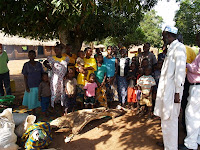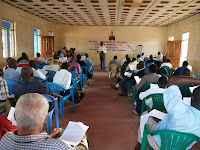
On Thursday September 2nd we were sitting in the middle of our bi-monthly general office meeting at ARLPI when my programme coordinator leans over and whispers to me, “are you ok with going to
Then came the quick scramble to get together a visa application including passport photos. Seeing as I don't work Fridays Geoffrey, our driver, came to pick up my passport early Friday morning to be taken to the Sudan consulate here in Gulu, and I didn't see it again until an hour before we left. As usual I had to get out a map to figure out exactly where Yambio, Sudan is, at which point I realized that Yambio was right in the centre of the current LRA occupied areas of Sudan on the board with the DRC and CAR. Hum... No one seemed to think there were any real security issues and so I followed their instincts. Although I was flying by the seat of my pants I knew I was being offered a great opportunity.
At five Sheik Musa Khalil (ARLPI's Muslim representative and the head of the Muslim community here in Gulu), myself, Geoffrey (ARLPI's driver) and one of project officers left in the ARPLI truck for Arua where we would stay for night before flying out the next morning. We arrived at 9:30pm in Arua, dropped off Sheik at his friend’s house, at which point the argument about where I should stay began. The two guys wanted to put me in a nicer hotel where I would be comfortable and safe, I on the other hand didn't want to be left alone in a new city. We ended up compromising by finding two hotels next to each other, one which was clean and had a self contained room and the other which was a disaster but cheap. You can guess who took which one.
In the morning we rose and left for the airstrip. About an hour after the scheduled departure time our chartered flight arrived. The Sheik and I boarded the small 15 passenger plane and off we went down the dirt runway. For the hour and fifteen minute flight we flew over the dense equitoria forest of the DRC and Sudan, it quickly became obvious to me how easy it would be to hide and sustain a rebel force in such a landscape. While we got an exit stamp in Arua, when we arrived in Yambio we simply walked off the plane and into the waiting car that took us to the Catholic conference centre, no security or immigration. The centre itself was a very simple but comfortable environment, after some time I was given a room that included a bed with a decent holeless net (not something to downplay the importance of), a folding chair and a bathroom. There was no running water so it was sponge baths and bucket flushing for the week. The conference staff were very friendly and accommodating. I went in search of a conference program and Sudanese phone-card in order to communicate to those back home. Upon looking through the schedule I quickly realized that we would not be returning home on Thursday, in fact it would be no earlier than Saturday. My first thought: at least I have enough malaria pills with me, underwear are washable.
Tuesday we were taken on a bus tour through Yambio, a town smaller then Gulu, but definitely an urban centre. We stopped briefly to speak with a group of internally displaced persons (IDPs) that had fled only two days before from LRA attacks about four miles out of town. That was the first time that the fact that I was now in an ongoing violent conflict context hit me, something that was evidenced again and again through out the week. On our return some of the religious leaders brought the IDP group a big sack of millet flour. An appropriate gesture I thought as it seemed wrong to be having a conference on how to handle the LRA situation with IDPs starving practically on our door step. Wednesday through Friday were the core days of the conference which were spent in a lot of dialogue, debate, and group discussion. Saturday morning we were driven to the airstrip at which point we still didn't know where the plane was dropping us off. I arrived home at 12:00 midnight after taking a car, plane, bus, boda, and collective taxi. I arrived home exhausted, sick, and feeling about ten years wiser in the world of peacebuilding and so so grateful that I'd made the trip.
My role in the conference qui ckly multiplied from that of doing documentation work for ARLPI and supporting the Sheik. It quickly became evident that my organizational and documentation skills would most likely come in handy. I quickly got pulled in to work closely with the funders from Pax Christi and CRS in tasks like producing the summary for the following day from the previous day, and writing the declaration and implementation plan which was a new and interesting experience for me.
ckly multiplied from that of doing documentation work for ARLPI and supporting the Sheik. It quickly became evident that my organizational and documentation skills would most likely come in handy. I quickly got pulled in to work closely with the funders from Pax Christi and CRS in tasks like producing the summary for the following day from the previous day, and writing the declaration and implementation plan which was a new and interesting experience for me.
I choose not to speak up in the general assembly meetings as I didn't think it was appropriate, but in the smaller group discussions I found my voice and opinions were often welcome since there were only two of us representing Uganda and ARLPI. ARLPI is perceived as the most experienced group and is truly sought after for its advice. On the one hand I'm tentative about speaking on behalf of an organization I've only worked with for three months, on the other hand I feel like they have so much experience it has to be passed on and as the documentation officer it's my role. I also found that my experience and knowledge of different conflict contexts came in handy. A particularly area of interest is the area of community protection from a non-violent standpoint. They had never heard of groups like the Non-Violent Peace Force or CPT and although those groups may never come or might not find the context appropriate for their work or simply might not have the resources, and they can't prevent deaths from occurring, they definitely won't come if not invited. I tried hard to invite them to think creatively about solutions, seeing as they were very stuck on supporting community defense units.
I remember one of my professors being very skeptical (though he did say he was growing less so) about the amount of influence a civil society group could have during the height of a conflict in terms of moving track 1 negotiations forward. In the Ugandan context I’m completely convinced that civil society is the only reason that negotiations moved forward in 2005/2006. The peace process had very little to do with the UN or foreign governme nts initially, though they played key roles through out the talks. It was fascinating for me to be part of a process from which new negotiations may or may not be a fruit. The conference concluded that negotiations are the most preferable option in reaching for sustainable peace. This means that many of the actions included in the implementation plan are aimed at initiating negotiations. I’ve gone from the classroom where we were following news clippings and trying to guess at which stage of the negotiations track Israel/Palestine were on, to being in the middle of an active group trying desperately to figure out how to move forward. This week I was faced head on the challenge that a crisis conflict reality brings. From the first day it looked like it might be almost impossible to get 35 religious leaders to agree on a pathway forward, never mind convincing the government representatives, UNMIN representatives, SPLA representatives and others of our position and that was just during one week! Now they have the great challenge of going out and convincing four governments (five if you count the US) to cooperate on a particular pathway. It’s easy to see how a “ripe moment” could easily be passed by in the multiplicity of voices. Yet, if all voices are not listened to and included in the conversation there is a much smaller likelihood of reaching sustainable peace. I’m now sure that any peace process, by the time the paper is signed (not even including implementation) at least 10000 people have been involved in some way. I knew through the study of theory and examples that peace processes were complex, but this week just took that complexity to a new level!
nts initially, though they played key roles through out the talks. It was fascinating for me to be part of a process from which new negotiations may or may not be a fruit. The conference concluded that negotiations are the most preferable option in reaching for sustainable peace. This means that many of the actions included in the implementation plan are aimed at initiating negotiations. I’ve gone from the classroom where we were following news clippings and trying to guess at which stage of the negotiations track Israel/Palestine were on, to being in the middle of an active group trying desperately to figure out how to move forward. This week I was faced head on the challenge that a crisis conflict reality brings. From the first day it looked like it might be almost impossible to get 35 religious leaders to agree on a pathway forward, never mind convincing the government representatives, UNMIN representatives, SPLA representatives and others of our position and that was just during one week! Now they have the great challenge of going out and convincing four governments (five if you count the US) to cooperate on a particular pathway. It’s easy to see how a “ripe moment” could easily be passed by in the multiplicity of voices. Yet, if all voices are not listened to and included in the conversation there is a much smaller likelihood of reaching sustainable peace. I’m now sure that any peace process, by the time the paper is signed (not even including implementation) at least 10000 people have been involved in some way. I knew through the study of theory and examples that peace processes were complex, but this week just took that complexity to a new level!
I feel honored to have participated in the week and am currently enjoying seeing implementation steps slowly being taken forward.





























